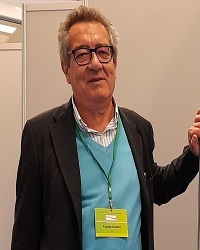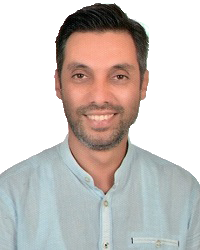Fausto Gardini is full Professor of Microbiology in the scientific disciplinary sector 07/I1 and carries out his activities in Cesena, at the Campus of Food Science (University of Bologna) in the Department of Agriculture and Food Sciences.
His current didactic activity at the University of Bologna includes the courses of “Diagnostic and Predictive Microbiology” in the Master degree in Food Science and Technology, “Microbiology of Animal Food Products” in the Master degree in Safety and Quality in Animal Production, and “Microbiology Applied to Animal-based Productions” in the Bachelor degree in Animal Production.
In the last years, his activity has covered different topics of food microbiology.
In particular, the main research areas were the following:
1) Biogenic amines production in different fermented foods (i.e. wine, salami, cheeses)
2) Evaluation of the effects of fermentation processes on quality and safety of dry fermented sausages
3) Study of dairy fermented food microbial populations (cheese and fermented milk)
4) Study of antimicrobial activity of natural compounds such as essential oils
5) Evaluation of the bioprotective potential of selected LAB cultures in different food matrices (fermented foods as well as fresh products) to increase shelf-life and safety.
6) Use of predictive microbiology to evaluate the microbial stability of foods in relation to the control factors applied.
7) Study of factors affecting the microbial quality of fishery products.
8) Study of yeast degradation potential in vegetable products (beverages and minimally processed fruits).
9) Physiological responses of microorganisms subjected to stress conditions
10) Set up and application of non-conventional microbiological analysis methodology
11) Fermented foods of animal origin as potential reservoir of microorganisms with multiresistance to antibiotics.
He is co-author of over 180 scientific papers published on international journals, articles published in national magazines and others of dissemination characteristics. At least 170 of these works are published in scientific journals indexed with Impact Factor contained in the ISI WEB and SCOPUS databases (h index 49 and 7514 total citations, according to Scopus, accessed on 17 May 2024) (https://orcid.org/0000-0002-0339-8785; Scopus Author ID: 7007115624). He is editor of the book “Manuale di microbiologia predittiva”, edited by Springer (ISBN 978-88-470-5355-7), and author or co-author of chapters of food microbiology in some national and international books.
He was Principal investigator for European and National projects, founded by the Ministry of University and Research and Ministry of Agriculture and by the European Community (POR-FESR, PSR). The most recent activities were:
- project “Bio-protective cultures and bioactive extracts as sustainable combined strategies to improve the shelf-life of perishable Mediterranean food (BIO PROMED FOOD)”, supported by the PRIMA programme of European Union (PRIMA 2019-SECTION2-4, Project ID 1467, CUP J34I19004820005).
- Innovative sustainable solutions for ready-to-eat traditional Mediterranean products and non-conventional healthy foods (INNOSOL4MED) supported by the PRIMA programme of European Union (PRIMA 2022-SECTION2-4, Project ID 1836, CUP J53C22004790006).
- project “Collezioni microbiche regionali: la biodiversità al servizio dell’industria agroalimentare – MicroEmiRo” (Regional microbial cultures: bioviversity as a tool for food industry) (CUP J12F16000010009), supported by Regione Emilia-Romagna (POR-FESR 2014-2020).
- Scientific coordinator of the project “Qualità e sicurezza di salami prodotti senza l’impiego di nitrati e nitriti (Quality and safety of fermented sausages produced without nitrate and nitrite) (CUP E23E18000080007), supported by Regione Emilia-Romagna (PSR 2014-2020).
He had different institutional positions. He has been director of the Center for Viticulture and Oenology research (CRIVE) of University of Bologna and he has been responsible for Process, Food, Consumptions and Health Area of the Interdepartmental Centre of Industrial Agrifood Research (CIRI) in the same University, in which he was Vice Director.




